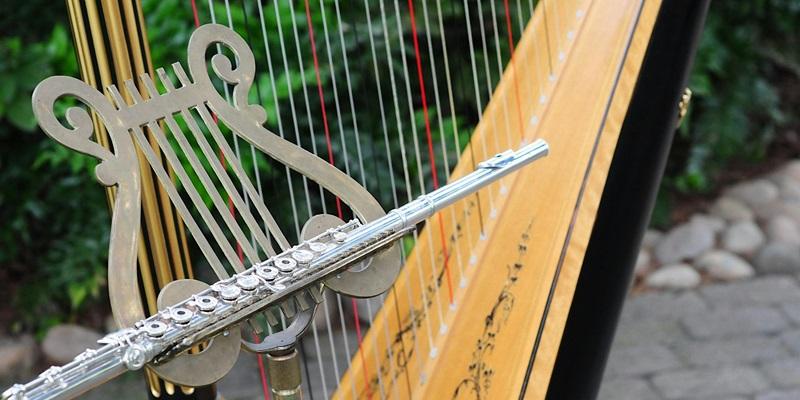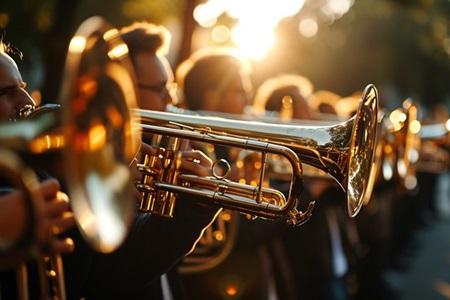A Pastor-Musician's Reflections on Jubal
A Pastor-Musician's Reflections on Jubal

Jubal appears in the biblical record at Genesis 4:21 and is designated “the father of all who play the harp and flute” – the patron saint of music, the protomusician. The most obvious significance of the man and his music is that they appear naturally along with other people and their activities (Genesis 4:20-22). The fact that the culture immediately in view is that of the descendants of rebellious Cain, and that Jubal himself is reared by the first known bigamist (look at his song of anger in Genesis 4:23-24), in no way nullifies the truth that musicians and music are as much good gifts of God as are cattle and cattlemen, bronze and iron workers, and ten thousand other things.
Another fact that should be obvious is that Jubal's label as “the father of all who play the harp and flute” doesn't leave percussionists, trombonists, pianists, and organists musically fatherless. (Note: If the Wesleys' and other eighteenth-century evangelicals' musical opinions had prevailed, the modern church pipe organ [“Satan's bellows”] would have been consigned to the bastard category, for their antipathy to it was every bit as strong as, if not stronger than, what some evangelical Christians feel towards the electric guitar.) For proof that the living and true God enjoys the clashing of cymbals in his ears along with the sound of the trumpet (his people praising him loudly), read/sing Psalm 150, among others.
The overarching thesis of this article is that the universal language of music, both vocal and instrumental, is one of God's most wonderful gifts given to the children of men and is for man's use and enjoyment, and the glory of God.
Few things in this world can compare with Jubal's ability to stir emotions, challenge the intellect, inform and/or anesthetize the mind, and calm the soul (reducing blood pressure while raising it at certain times in certain people!).
In the Old Testament we see armies summoned to battle at the sound of the trumpet and victories celebrated with music and dancing (Exodus 15). Laban reproaches Jacob for stealing away without allowing him to cheer his departure with mirth and songs with tambourine (Genesis 31:27). David chooses four thousand (of 38,000) Levites to serve as musicians in the temple in conjunction with antiphonal choirs and singers who played various instruments. Laments and dirges were written down to be sung, as were songs for all occasions – as evidenced by the wide range of themes found in the Psalms. In short, throughout the Old Testament we find that music is inseparable from all of life. And, for the most part, it is functional. (The notion of music for its own sake is a comparatively recent phenomenon in Western culture, part of the Enlightenment focus on the creature rather than the Creator.)

Concerning music in this New Covenant age, it has been argued (superficially, I believe) that due to the relatively few references to the subject, Jubal's prominence has been considerably reduced, and that to give him any significant place (as is done, for instance, in Greek Orthodox worship services) is pure abuse. By way of answer, all God's gifts are subject to abuse, and possibly none more so than music. But to argue that the New Testament virtually silences this good gift, presumably in favor of more pure “word” gifts, is itself an abuse – a historical and theological one. Counting up the number of New Testament verses on a particular subject is not the way to assess its importance, whether it be music or child rearing (which, fills the Old Testament book of Proverbs and thrills the most ardent “New Testament Christians”!).
For a bottom-line assessment of the New Testament's position on Jubal and his contributions, here are some comments from H. M. Best and D. Huttar, writing on “Music: Musical Instruments” in the Zondervan Pictorial Encyclopedia of the Bible (Merrill C. Tenny, general editor) – a worthwhile article that has contributed to my own thinking and writing,
The Christian concept of discernment among things, none of which in themselves are impure and are not “empowered” (the pagan concept), overrides any opinion which states that the early Church set a standard in music which was rigid, unchangeable and limited. The range of musical practice is to be construed as broadly as possible because it is based on principle which speaks to a total way of life, including music.
These words support my thesis that music is one of God's most wonderful gifts given to the children of men and is for man's enjoyment and God's glory. (Note: On the matter of construing musical practice in as wide a range as possible, this needs to be qualified in such a way as to recognize and preserve the biblical standard that God sets for the employment of music in worship.)
On the matter of Christian discernment, it should be obvious that Jubal is given much liberty in the area of musical expression. The Bible does not give us a set of musical absolutes or any examples of music. Furthermore, where there is much liberty, there is the need for humility and love, lest what we might claim as Christian musical discernment is only puffed-up personal opinion. And when that spirit prevails, Jubal becomes embroiled in controversy, and jubilation and joy are lost. (This subject is worthy of at least a separate article, if not an entire book!)
At the risk of being more provocative than intended, and raising the ire of some musically discerning friends, I will take the liberty of sharing some of my musical opinions, doing so in the context of freedom inviting response, and with the conviction that “the range of musical practice is to be construed as broadly as possible.” In the social and recreational sphere (including the home, but excluding church worship services), the pop ballads of the 1940s and 1950s – songs by Cole Porter, Victor Young, Jimmy Van Huesen, George Gershwin – provide me some listening enjoyment and immense satisfaction in making piano arrangements of them. Certain songs, beautiful as they are (to my ear), I totally exclude because of the antibiblical words which adhere to the melody. When I was preparing more than a dozen of them for the See & Hear “Fascination” CD and tape cassette, I had to be very careful not to practice these songs two hours at a time, filling our home with sounds that were not edifying to my “word sensitive” wife. A counteractive measure was for her to write a set of Christian words to the beautiful ballad, “The Summer Knows.”
More than a few members of our church get their feet going to a type of country and western music that I don't find particularly appealing. I believe they participate in it to their enjoyment and to the glory of God (1 Corinthians 10:31). The fact that I have a master's degree in musical composition does not give me the right to thumb my musical nose at their musical choices. Right now in conjunction with my Monday (day off) avocation, I'm preparing a piano album consisting of a stream of classical themes, including extended, and in some cases rearranged, musical “sound bites” from Chopin, Beethoven, Puccini, and Tchaikovsky. Some might be tempted to cry, “Foul play, Miladin,” but without biblical basis! Hopefully many people will derive listening satisfaction, if not great intellectual or aesthetic advancement, from this musical offering.

At least one of our church members (in good standing), who has a B.A. in music, listens occasionally to Christian rock (where the words are biblical and discernible – not overrun by an obtrusive beat). “How can she? All that repetition and syncopation, and what if she discovers that some of that music is written by sexual perverts?” If that response is allowed to pass for Christian discernment, then out goes Handel's Messiah (syncopation), Mozart's Hallelujah (repetition of one word), and all of Tchaikovsky (a homosexual). Even if a case can be made that man's chief musical end is to elevate the musical tastes of people (and Lachlan McBane and I are in favor of that), that doesn't exclude calling upon or joining with Jubal to engage in some “easy” or other kind of musical enjoyment.
Concerning Jubal inside the sanctuary, please don't allow him to dominate the service, whether by chants, chorales, hymns, psalms, or praise songs. Since it is the Word that edifies (1 Corinthians 14:12), I believe it wise to allow the Word itself to dominate. All musical selections – which should be relatively few in number, whether instrumental or vocal – should be associated with the Word. Not everyone on the session or music committee agrees with me on this, especially with regard to the musical prelude. And that's all right! God forbid that we fight over this or a hundred other musical matters on which Scripture is silent. Instead, let's talk; even more, may we increasingly rejoice and be thankful that the God and Father of our Lord Jesus Christ has given us Jubal – a world of song and musical instruments to use and enjoy to the glory of God.

Add new comment